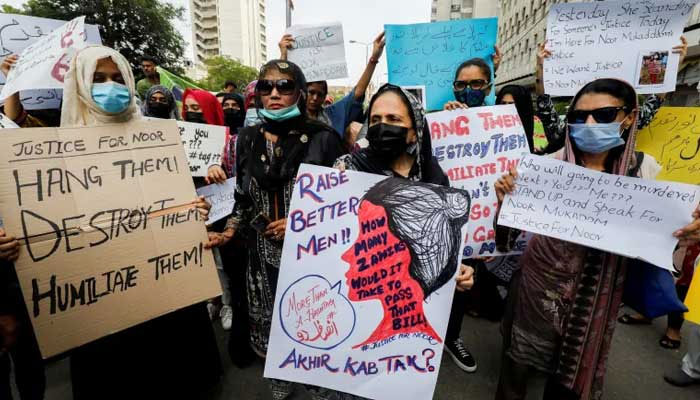No world for women
An estimated 25 per cent of all adolescent girls are abused by their partners
This Monday (November 25) marked the start of the annual 16 Days of Activism against Gender-Based Violence (GBV). The point of these 16 days is straightforward: to call for an end to GBV and mobilise action towards this goal. According to the UN, a woman was killed every 10 minutes in 2023 due to violence at the hands of her family or partner. An estimated one in every three women across the world will also experience violence at some point in their lifetime, with adolescent girls being particularly vulnerable to abuse. An estimated 25 per cent of all adolescent girls are abused by their partners. This makes violence against women and girls one of the most prevalent human rights violations in the world. The data for 2023 in particular shows just how urgent and widespread this crisis truly is. To make matters worse, what data we do have likely underestimates the true scale of the problem – if that is even possible – due to the fact that many women who experience violence often do not seek help due to legal, social or cultural constraints. Sadly, there is also plenty of evidence that governments around the world are not treating this problem with the seriousness that it deserves. As per the UN, a mere 5.0 per cent of government aid is spent on tackling violence against women and girls, with only 0.2 per cent being directed towards the prevention of this violence.
This paltry spending would make most GBV laws quite hard to enforce. That being said, even the elementary goal of having strong laws protecting women and girls seems to be too much for many countries. An alarming 86 per cent of women and girls live in countries without robust legal protections against violence or in countries where data are not available. When it comes to Pakistan, while there has been a more serious formal/legal posture from the state against GBV in recent years, there has yet to be a similar change when it comes to the situation on the ground. Right now, the country is grappling with an 81 per cent rise in the backlog of unresolved gender-based violence cases, according to a report on GBV trends in the country released by the Law and Justice Commission of Pakistan in August. This perhaps indicates that while the legal system is getting better at tracking GBV and more cases are being reported, solving them and prosecuting the perpetrators of the violence remains difficult.
The conviction rate in such cases is a very low 5.0 per cent while the chances of an acquittal are at 64 per cent. If the state is truly serious about eradicating GBV, it will have to deliver much better outcomes. And there is also a high chance that this problem will only become more acute for Pakistan and countries across the world as we move forward. The consequences of war, famine, climate change and economic crises tend to heighten the risk of women and girls being subject to violence and all of these phenomena are only trending upwards in today’s world. The imperative to increase both the legal protections against and resources available to tackle GBV has never been higher.
-
 Alix Earle And Tom Brady’s Relationship Status Revealed After Cosy Super Bowl 2026 Outing
Alix Earle And Tom Brady’s Relationship Status Revealed After Cosy Super Bowl 2026 Outing -
 Why King Charles Has ‘no Choice’ Over Andrew Problem
Why King Charles Has ‘no Choice’ Over Andrew Problem -
 Shamed Andrew Wants ‘grand Coffin’ Despite Tainting Nation
Shamed Andrew Wants ‘grand Coffin’ Despite Tainting Nation -
 Keke Palmer Reveals How Motherhood Prepared Her For 'The Burbs' Role
Keke Palmer Reveals How Motherhood Prepared Her For 'The Burbs' Role -
 King Charles Charms Crowds During Lancashire Tour
King Charles Charms Crowds During Lancashire Tour -
 ‘Disgraced’ Andrew Still Has Power To Shake King Charles’ Reign: Expert
‘Disgraced’ Andrew Still Has Power To Shake King Charles’ Reign: Expert -
 Why Prince William Ground Breaking Saudi Tour Is Important
Why Prince William Ground Breaking Saudi Tour Is Important -
 AOC Blasts Jake Paul Over Bad Bunny Slight: 'He Makes You Look Small'
AOC Blasts Jake Paul Over Bad Bunny Slight: 'He Makes You Look Small' -
 At Least 53 Dead After Migrant Boat Capsizes Off Libya
At Least 53 Dead After Migrant Boat Capsizes Off Libya -
 'God Of War' Announces Casting Major Key Role In Prime Video Show
'God Of War' Announces Casting Major Key Role In Prime Video Show -
 Real Reason Prince William, Kate Broke Silence On Andrew Scandal Revealed
Real Reason Prince William, Kate Broke Silence On Andrew Scandal Revealed -
 Drew Barrymore Responds To 'Charlie's Angels' Costar's Comments About Her
Drew Barrymore Responds To 'Charlie's Angels' Costar's Comments About Her -
 Shakira Slips Hard On Stage During Life Show
Shakira Slips Hard On Stage During Life Show -
 King Charles Speaks Out Over Andrew's Scandal: 'Stand Ready To Help Police'
King Charles Speaks Out Over Andrew's Scandal: 'Stand Ready To Help Police' -
 Dax Shepard Recalls Horrifying Accident That Almost Killed Him
Dax Shepard Recalls Horrifying Accident That Almost Killed Him -
 Logan Paul's Bodyguard Hits Fan On Super Bowl Day
Logan Paul's Bodyguard Hits Fan On Super Bowl Day




